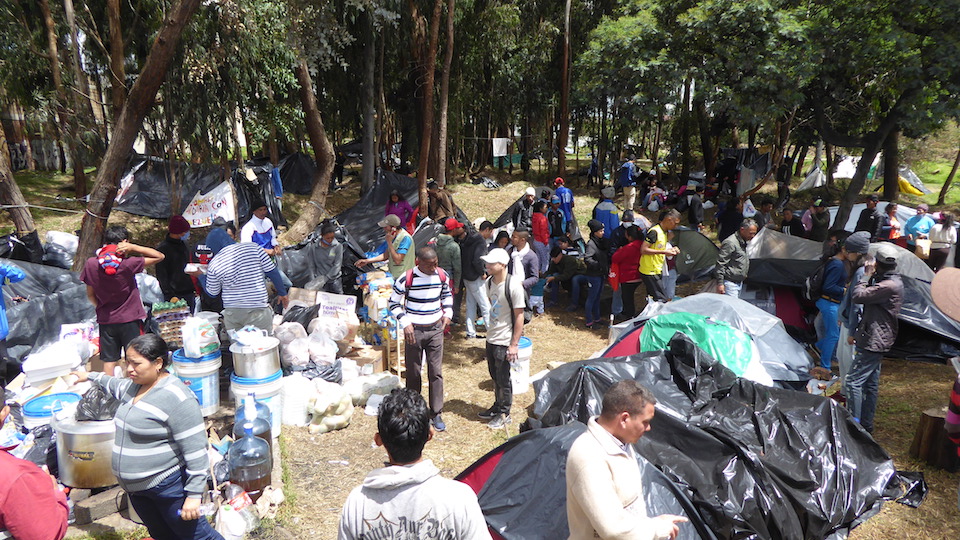 Whether they are called migrants or refugees, they need protection and access to the formal economy.
Whether they are called migrants or refugees, they need protection and access to the formal economy.
Several human rights groups have raised the alarm over the living conditions and short-term future for fleeing Venezuelans. Not only do they need food and shelter, they are vulnerable to violence, exploitation and abuse – especially if denied the legal status that would let them work and access social protection.
Refugees or migrants?
The terminology is important here. Are they refugees or migrants? Are they fleeing? Or just seeking better horizons?
This split in UN management-speak carries big implications. Refugees have been forced out by persecution and can’t count on the protection of their own homeland. Migrants might be escaping dire poverty, but they took a free choice to travel. The crucial difference under international law is that migrants can be deported back to their place of origin, even if it’s in complete bedlam. Refugees can’t.
So as in Europe with the Syrian arrivals, the Latin American countries receiving Venezuelans prefer to call them ‘migrants’ and not ‘refugees’, keeping the door open to send them back. And shamefully the US, while highlighting that Venezuela is a failed state and hinting at regime change, is refusing asylum to Venezuelans fleeing north. Washington is even deporting them.
That’s why Amnesty are arguing that Venezuelans have been expelled by force – the dangerous situation in their home country – rather than just economics. In an open letter that coincided with a special convening of the Permanent Council of the Organization of American States at the start of September, Amnesty called on receptor countries such as Colombia to grant migrants “unrestricted access to international systems of protection such as refugee status” and drop the requirements for passports or visas.
Read our full coverage of the Venezuelan migrant crisisThis is how you can help: Several organisations can do something with your help.From riches to rags: What happened in Venezuela and why are people leaving?Interviews with Venezuelans #1: ‘We left because there was no food.’Interviews with Venezuelans #2: ‘I had to leave because I denounced the corruption.’Going Local, Voting with their feet: Columnist worries that goodwill has an expiry date.Compassion and condemnation: The struggle for acceptance in a crowded capital. |
It also demanded that countries respect the “principle of non-refoulement” which means not pushing migrants back into their home country. In practice this means allowing Venezuelans access to public services, health, education and freedom of movement, as well as the right to family unity and the right to work.
Documentation
Colombia’s Migration Office recently reported the country was receiving at least 3,000 Venezuelans a day, but that figure was set to rise. Colombia has given temporary residence permits (PEPs) to just over 180,000 migrants which theoretically give access to work, health and social services.
Almost 450,000 have registered with the Registry of Venezuelan Migrants (RAMV), which is more like a census and does not give them legal status.
The Bogotá Post heard from longer-term migrants who had received PEPs, but said this was no guarantee of work and that the city’s overstretched health and social services were sometimes hard to access. More recent arrivals were impoverished and disorientated, and ignorant of the mechanisms to get state assistance – a bureaucracy which confounds even local Colombians – and forced to live on the streets.
Many observers such as the UN also recognise that Colombia is particularly fragile in the face of the migrant influx because of its chronic lack of resources, particularly in rural areas. The country has seen the largest numbers of arrivals and is itself as a country recovering from decades of conflict.
So far, Colombian authorities, from Bogotá mayor Enrique Peñalosa to Colombia’s new president Íván Duque – and his predecessor Juan Manuel Santos – have signalled compassion for the victims of the crisis. Ecuador and Peru have announced that Venezuelans will be required to provide passports at their borders, but Migración Colombia boss Christian Krüger took a much softer line, saying “requiring passports from Venezuelan citizens when we know that the government is not issuing them is punishing the people for the mistakes of their leaders.”
Red tape
Practical assistance put in place by the mayor’s office in Bogotá includes health care and outreach programs such as the mobile vaccination clinics we witnessed at the Salitre Bus Terminal this week. To date 29,000 migrants have been vaccinated, mostly for measles, tetanus and chicken pox.
But as a July report by the Washington Office for Latin American Affairs (WOLA) pointed out after visiting Cúcuta in April the government’s activities are undermined by red tape. The only government-run shelter near the border has 250 beds, but “sits largely empty most of the time” because migrants are not allowed in unless they have documentation.
The report along with a recent op-ed in the New York Times stressed that without a coherent state response, migrants will face trafficking, exploitation, abuse and discrimination. Additionally, as a number of the newcomers are settling in violent areas recently vacated by the FARC, “This makes them not only vulnerable to violence and harm, but also to recruitment by illegal armed groups.”
One consistent thread of the Colombian government’s approach has been to call for more international assistance. Most recently, the Duque administration called for the creation of a special United Nations envoy.
This would be an “important step”, but Colombia should not “wait for the UN to lead by example”, said WOLA: “After years of dealing with the human rights and displacement problems stemming from its own internal conflict, Colombia has a wealth of experiences on which to draw from in this effort.”
Gerald Barr





